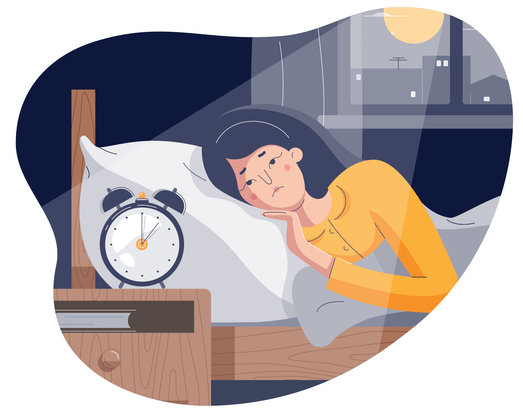Sleep Disruptions

Restless nights aren’t random. When you spot the disruptors, you start to take your sleep back.
Unmasking the Culprits Behind Your Restless Nights
Have you ever found yourself staring at the ceiling at 3 AM, wondering why sleep seems to elude you? You're not alone. Sleep disruptions affect millions of people worldwide, turning what should be a rejuvenating experience into a frustrating struggle.
✅Understanding what's keeping you awake is the first step toward reclaiming your nights and energizing your days.
Table of contents
1. The Biology Behind Broken Sleep
2. Environmental Disruptors
3. Psychological Factors: When Your Mind Won't Rest
4. Lifestyle Choices That Sabotage Sleep
5. Medical Conditions and Sleep
6. The Digital Age: Technology's Impact on Rest
7. Breaking the Cycle: First Steps Toward Better Sleep
8.The Path Forward
1. The Biology Behind Broken Sleep
Sleep isn't simply an on-off switch—it's a sophisticated biological system controlled by two primary mechanisms. Your sleep drive (homeostatic process) builds throughout your waking hours, creating pressure to sleep that increases the longer you're awake. Meanwhile, your body clock (circadian rhythm) regulates the timing of sleep, making you naturally sleepy at night and alert during the day. ⏰
When either system gets disrupted, your sleep suffers. Dr. Rachel Manber, a leading sleep researcher, explains that "sleep occurs most naturally when sleep-promoting factors predominate over alertness-promoting factors." Unfortunately, modern life is filled with elements that tip this delicate balance toward alertness when we need rest most. ⚠️
There is also, The Chemistry of Sleep: What Your Brain Needs to Rest.
2. Environmental Disruptors: The Bedroom Battleground
Your sleep environment plays a crucial role in sleep quality. Temperature fluctuations, excessive noise, uncomfortable bedding, and too much light can all interfere with your sleep architecture. Research shows that even the blue light emitted from smartphones and tablets can suppress melatonin production for up to three hours, making it harder to fall asleep. 📱
"Your bedroom should be a sanctuary dedicated to sleep," notes sleep specialist Dr. Colleen Carney. "When you use your bed for activities other than sleep—like working, watching TV, or scrolling through social media—you weaken the mental association between your bed and sleep." 🛏️
3. Psychological Factors: When Your Mind Won't Rest 🌀
Perhaps the most powerful sleep disruptor is an overactive mind. Racing thoughts, anxiety about the day ahead, or ruminating on past events can keep your brain in a state of high alertness incompatible with sleep. This creates a frustrating cycle: worrying about not sleeping makes it harder to sleep, which leads to more worry. 🤯
Research from the University of Pittsburgh confirms that people with insomnia show higher brain activity in areas that should quiet down during sleep. This hyperarousal can persist even when you feel physically exhausted. 🤔
4. Lifestyle Choices That Sabotage Sleep ☕
Many daily habits that seem unrelated to sleep can significantly impact your ability to rest:
- Caffeine consumption: Caffeine has a half-life of 5–7 hours, meaning that afternoon coffee can still be active in your system at bedtime.
- Irregular sleep schedule: Varying your bedtime and wake time by more than an hour creates "social jet lag," disrupting your body clock.
- Evening alcohol: While alcohol might help you fall asleep initially, it disrupts the second half of your night's sleep, causing fragmentation and early awakening.
- Daytime napping: Particularly when taken in the late afternoon, naps can decrease your sleep drive and make it harder to fall asleep at night.
5. Medical Conditions and Sleep
Numerous health conditions can interfere with sleep quality. Sleep apnea, characterized by breathing pauses during sleep, affects approximately 25% of men and 10% of women. Chronic pain conditions, heartburn, and hormonal changes can all trigger awakenings throughout the night.
Medications can also play a role. Some antidepressants, blood pressure medications, and corticosteroids may contribute to insomnia as a side effect. Even over-the-counter medications like those containing pseudoephedrine can keep you alert when you want to be sleeping. 💊
6. The Digital Age: Technology's Impact on Rest 📲
Our 24/7 connected world presents unprecedented challenges to healthy sleep. Not only does the content we consume stimulate our minds, but the devices themselves affect our biology. A 2019 study found that 70% of adults check their phones within 30 minutes of bedtime, despite evidence that this habit significantly delays sleep onset. 🚀
"The psychological impact of being constantly available and connected creates a state of alertness that's fundamentally at odds with the relaxation needed for sleep," explains Dr. William Dement, known as the father of sleep medicine.
7. Breaking the Cycle of Disruptions: First Steps Toward Better Sleep 🔑
Understanding what disrupts your sleep is powerful knowledge. While identifying your personal sleep disruptors is essential, the good news is that most sleep issues can be addressed through evidence-based approaches. 🎯
Cognitive Behavioral Therapy for Insomnia (CBT-I) has been shown to be more effective than medication for long-term sleep improvement. This approach addresses both the behavioral and thought patterns that perpetuate sleep problems.
Simple changes can make a significant difference:
- Establish a consistent sleep schedule
- Create a comfortable sleep environment
- Develop a relaxing pre-sleep routine
- Limit screen time before bed
- Manage stress through relaxation techniques
8. The Path Forward
Sleep disruptions rarely have a single cause. More often, they result from a combination of factors that reinforce each other. The most effective approach is to examine your sleep habits holistically, making gradual adjustments that address both the biological and psychological aspects of your sleep.
Remember that an occasional night of poor sleep is normal and nothing to worry about. It's persistent sleep disruptions that warrant attention. By identifying your personal sleep disruptors and making targeted changes, you can rebuild a healthy relationship with sleep—one restful night at a time.
Your journey to better sleep starts with awareness and continues with action. What will you change tonight?
